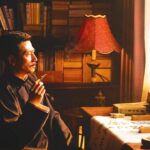Taking in 335 million yuan ($45.6 million) at the Chinese mainland box office in less than two weeks, Hollywood blockbuster Oppenheimer has been fairly influential in China not only due to Christopher Nolan’s sophisticated directing, but also the film’s depiction of a country’s “nuclear defensive” mission during wartime. Such a theme has also had an impact on reminding Chinese moviegoers about the country’s own “atomic bomb” film produced in 1999, Roaring Across the Horizon.
The combination of Oppenheimer and Roaring Across the Horizon has become a trending topic on hot sites like China’s Twitter-like Sina Weibo and the IMDb-like Douban. As both films tell a country’s “atomic bomb” story, many moviegoers said they were “reminded right away” of Roaring Across the Horizon after watching Oppenheimer.
“Talking about the film’s structure and also its spirit, which praises heroism and patriotism, it was similar to the point that I thought Nolan had seen the 1999 Chinese film,” Ma Ao, a Nolan fan in Shanghai, told the Global Times.
While the movies’ increasing popularity has caused them to be marketed as a “sales bundle” in cities such as Changsha, Central China’s Hunan Province, when it comes to narrative, genre and content, they have very little to do with each other mainly due to the different trajectories of China and the US’ atomic bomb development programs.
Set during the Cold War, biographic Oppenheimer tells stories about the leader of the Manhattan Project, US scientist Robert Oppenheimer. Through depicting the ups and downs in the scientist’s life, Oppenheimer reflects the “US’s political and ideological environment of the time, which was linked with the country’s patriotism, worries and ambitions in coping with global war dynamics,” historian Qiao Xiong, who rates the film an 8 out of 10, told the Global Times.
Set in the 1950s and 1960s, Roaring Across the Horizon depicts a group of Chinese scientists’ efforts in making the country’s first atomic bomb during a time when China could barely manufacture its own tractor.
Oppenheimer and Roaring Across the Horizon have also provoked a rather intellectual “coffee or soybean milk” debate among netizens.
“I won’t be convinced if a country’s power is all tied up to an individual’s fate. Not all movies needed to be rendered by Hollywood heroism, especially fact-based biographies,” posted a netizen on China’s Sina Weibo.
Also on the site, a Chinese film critic followed by more than 2.3 million fans posted that debating which production is better comes down to preferences, just like one’s preference for soybean milk or coffee.
Film critic Lu Jingci told the Global Times that such a narrative divergence, one being “individual heroism” and another being “collective patriotism,” makes the two productions “representatives of how national ideology is conveyed differently in media productions.”
“Different lands nurture different flowers,” said Lu, adding that the Chinese Roaring Across the Horizon was a “good example” for many later patriotic films such as The Battle at Lake Changjin in 2021.
Roaring Across the Horizon was already popular prior to Oppenheimer. The film made its streaming debut on Chinese video platform Bilibili, a site popular among Gen Z viewers, in 2018. It was liked by 307,000 users.
“I really hope the film can be screened again during the upcoming National Day holiday. That would be the perfect moment to pay homage to those pioneers as well as to our country,” one netizen posted on Sina Weibo.
(Global Times)



